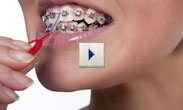Can adults wear braces?

Braces aren’t just for kids — more adults are having their teeth straightened. If you are considering braces, you’ll be happy to know you have more choices than ever.
Why would adults need braces?
If you didn’t have orthodontic treatment as a child, you may have had problems that were left untreated like an overbite or underbite, crooked teeth or a misaligned jaw. You could be experiencing tooth decay, headaches and earaches, chewing issues or gum disease as a result. As an adult, you may have a better opportunity to get these problems fixed.
How do I know if I need braces?
Discuss any concerns with your general dentist during your regular checkup or make an appointment to see your dentist if you are experiencing any pain. Your dentist may recommend an evaluation from an orthodontist, a dentist who specializes in straightening or moving misaligned teeth and jaws. An orthodontist has completed a four-year dental graduate program as well as two to three years of advanced education in orthodontics.
How do I find an orthodontist?
You should ask your dentist for a recommendation, ask friends or family for references, or use our Find a Dentist tool, which now links to Yelp reviews.
What should I ask the orthodontist if I’m thinking about braces?
Your first consultation with an orthodontist should cover several areas, including:
- How will braces correct my problem?
- How long will I need to wear braces?
- Will I be able to schedule appointments at convenient times?
- What is the overall cost and when do I make payments?
- What will insurance pay for and what are my out-of-pocket costs?
What kind of braces should I get?
Many orthodontists recommend metal braces for their reliability but, thanks to technology, you may have other options. Talk with your orthodontist about what would work best for you.
| Types of braces |
|---|
| Metal braces made of high-grade stainless steel are attached to the front of your teeth. You may experience discomfort because the brackets attached to the teeth can rub against the skin in your mouth. Your dentist will provide dental wax you can place over the brackets to help ease any pain. |
| Clear ceramic braces are worn like traditional steel braces, and because they blend with the color of your teeth, they’re less noticeable. Ceramic braces can break more easily than their metal counterparts. |
| Lingual (also known as concealed) braces have brackets that attach to the back of teeth, so they are hidden from view. |
| "Invisible" braces are clear, customized, removable appliances. You can take them out when you eat, brush and floss, so you won’t have food trapped between your teeth. Invisible braces are a good option when you have only a mild spacing problem. |
What foods should I avoid with braces?
Certain foods can damage your braces. Skip hard candy, corn on the cob and nuts. Other problem foods include raw carrots, popcorn, pretzels and crushed ice. These can damage your wires and brackets.
You want to be sure to stay away from sticky foods, too, like gum, caramel and taffy, which can get caught between your braces and teeth.
Eating the wrong foods can be costly if you have to repair or replace damaged braces and can also mean having to wear them longer.
Also, be aware of how much carbohydrates you eat, because these break down into sugar. Bacteria in the mouth feed on these sugars and produce acid, leading to tooth decay. Be sure to keep your teeth and brackets clean, especially if you wear cemented, non-removable braces. Food can get trapped between your teeth and gums more easily, so brushing, flossing and rinsing are recommended after every meal.
Do I need to keep getting checkups while I have braces?
Yes, it’s more important than ever to get regular cleanings from your general dentist while you have braces because good dental hygiene can be harder to maintain.
Is orthodontic treatment different for adults?
Your treatment might last longer because your teeth have stopped growing. This means it’s harder to force your teeth to go a certain direction when you’re older because the teeth are set and more difficult to pressure to move. Depending on your situation, you might wear your braces for anywhere from 18 months to three years. Regardless of age, you’ll wear a retainer after treatment to keep your teeth from moving back.
How much will braces cost?
First, check your plan information on our website to make sure you have orthodontic coverage. Costs can vary depending on your coverage, the services you need and whether or not you visit an in-network dentist. Delta Dental can help estimate costs before treatment begins. Ask your dentist to submit a pre-treatment estimate to us, and we’ll send you an overview of the total treatment cost, including how much your plan pays and your share of the cost.
Related reading
The oral health information on this web site is intended for educational purposes only. You should always consult a licensed dentist or other qualified health care professional for any questions concerning your oral health.


Stay Informed
Subscribe to our Wellness E-MagazineCheck out the latest issue
Read back issues